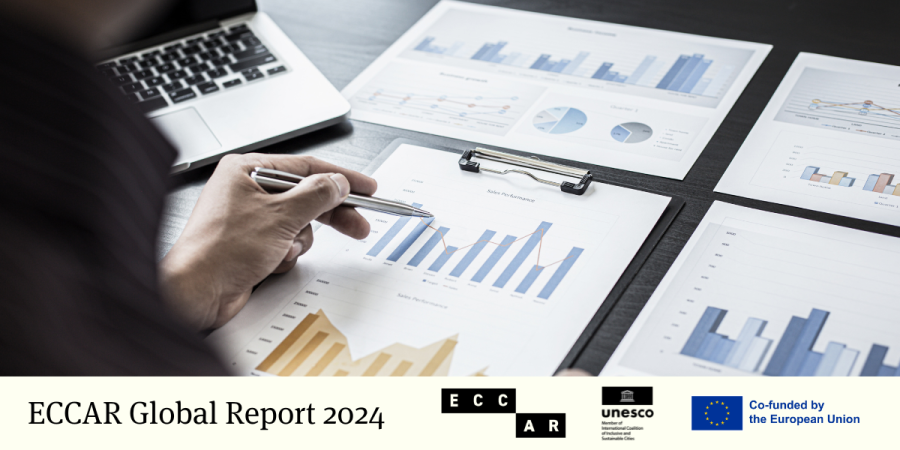
This year, 30 ECCAR member cities used the Online City Reporting Tool to report on their local work. For the first time, so many cities reported at once, which means that the data on what the current issues and challenges are in European municipalities in the field of anti-racism has grown significantly compared to previous years. As part of the reporting feedback mechanism, each city received an individual feedback letter from ECCAR's Scientific Advisory Council, including UNESCO. This feedback letter contains feedback specific to the respective city, in which individual municipal measures are evaluated and recommendations are made by ECCAR's Scientific Advisory Council. There is also a General Feedback, which summarises the most important findings from the overall evaluation of all reports:
General observations of ECCAR's Scientific Advisory Council (SAC)
Based on the 33 reports, the SAC agreed on seven observations, which are of interest to the reporting cities, the members of the coalition and the ECCAR as a network of cities and local governments.
1 – The SAC welcomes the increased awareness of racism as a phenomenon, which is not overcome but is persistent and needs ongoing efforts to be prevented, eliminated and sanctioned. In addition to recognising the existence of racism in European urban societies, the members’ awareness of racism as an ideology of inequality increasingly accepted by people has grown.
2 – The SAC further welcomes the trend that more and more cities make efforts to identify racism and discrimination within their own structures, and reflect in depth about how to address structural as well as systemic discrimination and about how to deal with racist behaviour of city employees or citizens, which might occur in municipal service provision.
3 – The SAC is interested to learn that cities are concerned about participation in public affairs and about fighting under-reporting, relying on the cooperation with and joint creation of networks as well as platforms including relevant civil society organisations to achieve these goals. The cooperation with civil society organisations is a chance for more empowerment. This is particularly important for guaranteeing the rights of racialized groups who are affected by the strong rise in racism and discrimination.
4 – In addition to their efforts to prevent and promote equal opportunities for racialized people or groups, the SAC encourages ECCAR members to also focus on eliminating and sanctioning racial and intersectional discrimination. In this context, the SAC would like to remind them that actively pursuing equality and guaranteeing equal treatment might mean cutting or eliminating the privileges of dominant groups in society. The SAC would also like to draw the attention of cities to the importance of monitoring hate-speech and hate-crimes and appropriately reacting to these trends in concert with the relevant authorities and stakeholders.
5 – The SAC recommends setting clear and workable objectives when planning their policies and the measures linked to them, thus introducing a result-oriented approach in the cities’ management. In this context, the SAC recommends a stronger focus on reporting in the fight and elimination of racism. The SAC further recommends basing result-oriented approaches in policy-making on evidence and therefore encourages the introduction of appropriate mechanisms to collect and evaluate data on (in)equalities.
6 – Consequently, the SAC recommends that cities formulate action plans and link measures to the areas of the ECCAR 10-Point-Plan-of-Action (10PPA). The Steering Committee of UNESCO’s International Coalition of Sustainable and Inclusive Cities has confirmed the 10PPA as a unique tool in the implementation of UNESCO’s Roadmap against Racism.
7 – Finally, the SAC encourages local governments to make use of the opportunities in multi-levelgovernance, and to lobby for actions against racism and discrimination also on the respective regional and national levels in order to raise awareness for institutional cooperation in the creation of harmonized policies at all levels of governance. Cities can play a key role in framing and setting policies at both the regional and national level, recognizing that anti-racism and equality are key components of democracy.
Closing Round & feedback from the cities
This year's reporting cities met for a closing round with ECCAR's Scientific Advisory Council to mark the conclusion of the reporting cycle 2024. Some of the main expressed wishes were that ECCAR member cities benefit in particular from peer-to-peer learning exchanges with other cities and experts. In addition to working group meetings and online webinars, the Online City Reporting Tool offers a learning platform on anti-racism measures at municipal level. It not only enables reporting, but also allows ECCAR member cities to access the reports and good practices of other cities. There is also a great demand for training on the topic of equality data collection and ECCAR will offer at least three online webinars on this topic next year as part of the new Equality Data Collection working group.
Global Report 2024
You can download the Global report 2024, which summarises the key findings of this year's reporting round, at the bottom of this page.
